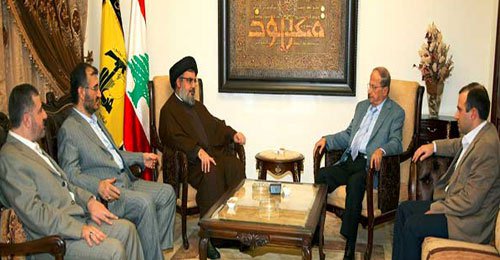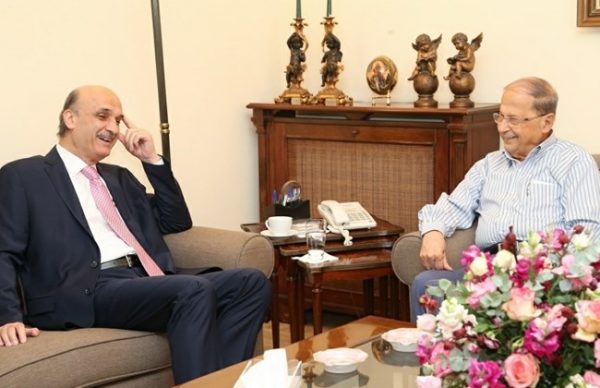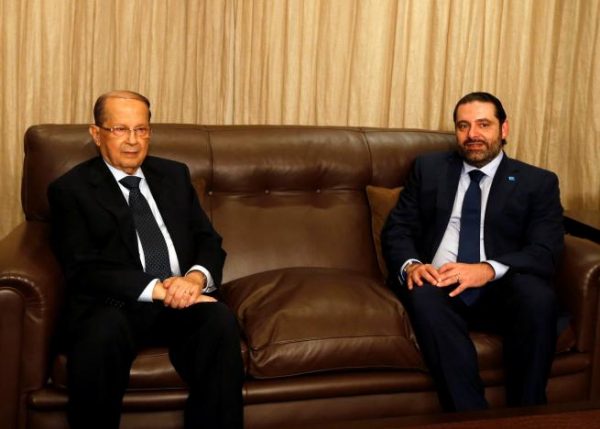
By Makram Rabah
On Oct. 31, the Lebanese Parliament is slated to convene to elect a president for the republic, a post which has remained vacant since former president Michel Suleiman left office in May 2014. The previous 45 attempts of the national assembly to elect a president ended in failure, as legislators belonging to the pro-Syria/Iran March 8 alliance boycotted the elections, preventing the required quorum of 2/3 for the sessions to proceed.
The end of this projected deadlock was prompted by [former prime minister] Saad Hariri’s endorsement of his former archenemy Michel Aoun as president, thus securing enough votes for the latter to defeat his opponent Sleiman Franjieh, who, ironically, had been named by Hariri over a year ago.

This strange turn of events will possibly allow Aoun, the omnipresent presidential contender, to legitimately occupy the presidential palace in Ba’abda, after he had done so illegally as an intern prime minister in 1989. The crux of the matter, however, might not be the election of Aoun but rather how this controversial figure will honor the promises he had issued to the factions which secured his election.
As it stands, Aoun has signed what amounts to three Faustian deals: one with [Shia group] Hezbollah, a second with Samir Geagea and the Lebanese Forces, and the third and most recent one with Hariri and the Sunni Future movement. These conflicting contracts cannot logically or legally be implemented unless one of them gains primacy thus annulling the other two.
By going forward, Aoun will place himself in a political and legal estoppel. This legal concept which Aoun naturally does not acknowledge precludes people “from denying or alleging a certain fact owing to that party’s previous conduct, allegation, or denial.” In layman’s terms, one cannot go into contract with any entity and then sign another contract or act in a way which prevents the initial contact from being fulfilled.

Complicating matters further is the fact that Aoun’s initial contract was the Memorandum of Understanding (MoU) he signed with Hezbollah in 2006, which granted the pro-Iranian faction the much-needed Christian cover which they lacked at the time. By empowering Hezbollah, this MoU also further weakened the Lebanese state which was gradually engaged in reconstruction efforts for the damage inflicted by Hezbollah’s war with Israel.
In January 2016, Aoun proceeded to sign another contract with Samir Geagea, the leader of the Lebanese Forces, ending a somewhat primordial enmity which included a mini Christian civil war between the two in the late 80s. Among the items which Aoun agreed to endorse was a pledge to “empower and encourage the rise of the Lebanese state institutions and to foster a culture of legality and a shunning of violence in settling any dispute, regardless of circumstances and cause.”
The Aoun-Geagea pact, sound as it may seem, openly clashes with Aoun’s MoU with Hezbollah, whose overall spirit and aim allow the latter to keep a parallel state structure that tolerates this Iranian militia to operate outside the realm of Lebanese state sovereignty. These allegations are substantiated by previous instances where Hezbollah has resorted to violence to enforce their political will. The May 7, 2008 attack on the [Fouad] Siniora government is a case in point.
Finally, Aoun’s last contract recently signed with Hariri is more simplistic in nature and involves more practical provisions which envisage the division of political booty once Aoun is elected president. However, Hariri, who is a patron of the Kingdom of Saudi Arabia, clearly expects Aoun to adopt a more constructive approach in dealing with the kingdom. This entails abandoning his support for the regime of Bashar al-Assad and taking a somewhat unsupportive position on Hezbollah’s involvement in the Syrian civil war.
This process of wishful thinking, however, on the part of Hariri was shattered as [Hezbollah leader] Hassan Nasrallah took to the pulpit shortly after the Aoun-Hariri pact was announced, declaring that Hezbollah would leave Syria only after a complete victory was achieved. Nasrallah, regardless of what Aoun has promised his new ally, will persist in his attacks against Saudi Arabia, which in the midst of the new developments in Iraq and Yemen, is only expected to further escalate.
While Aoun is perceived by the majority of the regional and international actors as unfit to rule due to his close association with Hezbollah, the real challenge is elsewhere. Next Monday, once Aoun leaves the parliament building and heads to the presidential palace to serve his six years in office, which Faustian deal will he honor? Will Aoun’s promises and debts be void, or will this aging politician keep signing more checks which no one can cash; pushing Lebanon further into chaos?
Makram Rabah is political analyst and the writer of “A Campus at War: Student Politics at the American University of Beirut, 1967–1975”
Anadolu Agency

Leave a Reply
You must be logged in to post a comment.